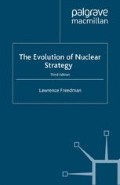Abstract
By the mid-1950s it was already becoming habitual to put the word ‘win’ in quotation marks when using it in connection with nuclear war. Traditional notions of victory and defeat dissolved in the face of the unavoidable level of destruction that even the technical winner would suffer. Every victory would be pyrrhic. Such a view lay behind the efforts of limited war theorists to encourage moderation in war-aims. There was little point in fighting for total objectives when this would require an unattainable total victory.
Preview
Unable to display preview. Download preview PDF.
Notes
Paul Nitze, ‘Atoms, strategy and policy’, Foreign Affairs, xxxiv:2 (January 1956), pp. 190–1. See also Glenn Snyder, Deterrence and Defense, p. 68: ‘The concepts of “winning” and “losing” have to do with the military or power outcome of the war. … They have nothing to do with the intrinsic costs of damage suffered in the war.’
For example John Foster Dulles: ‘Khruschev does not need to be convinced of our good intentions. He knows we are not aggressors and do not threaten the security of the Soviet Union’, quoted in Robert Jervis, Perception and Misperception in International Politics (Princeton: Princeton University Press, 1976), p. 68. The most careful critique of preventive war as a policy can be found in Brodie, Strategy in the Missile Age, pp. 228–91.
W. D. Puleston, The Influence of Force in Foreign Relations (New York: Van Nostrand, 1955), From extract in US News & World Report (4 February 1955), p. 133.
Col. Jack Nicholas, ‘The element of surprise in modern warfare’, Air University Quarterly Review (Summer 1956), pp. 3–4.
Charles Murphy, Fortune (July 1953). Though accepting the need for a limited air defence effort, Murphy insists that protection against nuclear attack is ‘unattainable and in any case completely impractical, economically and technically’.
Quoted in George E. Lowe, The Age of Deterrence (Boston: Little, Brown & Co., 1964), pp. 100–1.
Colonel Robert Richardson, ‘Do we need unlimited forces for limited war’, Air Force (March 1959).
Quoted in Daniel Yergin, Shattered Peace: The Origins of the Cold War and the National Security State (London: André Deutsch, 1976), p. 478.
Brodie, Strategy in the Missile Age, pp. 270, 278, 311, 397. See James King’s excellent review, ‘Airpower in the missile gap’, World Politics, xii:4 (July 1960), pp. 628–39.
H. Kahn, On Thermonuclear War (Princeton: Princeton University Press, 1960), pp. 559–60.
The story of the strategic bases study is told in Bruce L. R. Smith, The RAND Corporation: Case Study of a Non-profit Advisory Corporation (Harvard: Harvard University Press, 1966).
The Report was published as A. J. Wohlstetter, F. S. Hoffman, R. J. Lutz and H. S. Rowen, Selection and Use of Strategic Air Bases, RAND R-266, 1 April 1954 (declassified 1962).
Albert Wohlstetter, ‘The delicate balance of terror’, Foreign Affairs, xxxvii:2 (January 1959).
George F. Kennan, Russia, the Atom and The West (New York: Harper & Brothers, 1958), pp. 52–4.
Author information
Authors and Affiliations
Copyright information
© 2003 Lawrence Freedman
About this chapter
Cite this chapter
Freedman, L. (2003). The Importance of Being First. In: The Evolution of Nuclear Strategy. Palgrave Macmillan, London. https://doi.org/10.1057/9780230379435_9
Download citation
DOI: https://doi.org/10.1057/9780230379435_9
Publisher Name: Palgrave Macmillan, London
Print ISBN: 978-0-333-97239-7
Online ISBN: 978-0-230-37943-5
eBook Packages: Palgrave Political & Intern. Studies CollectionPolitical Science and International Studies (R0)

